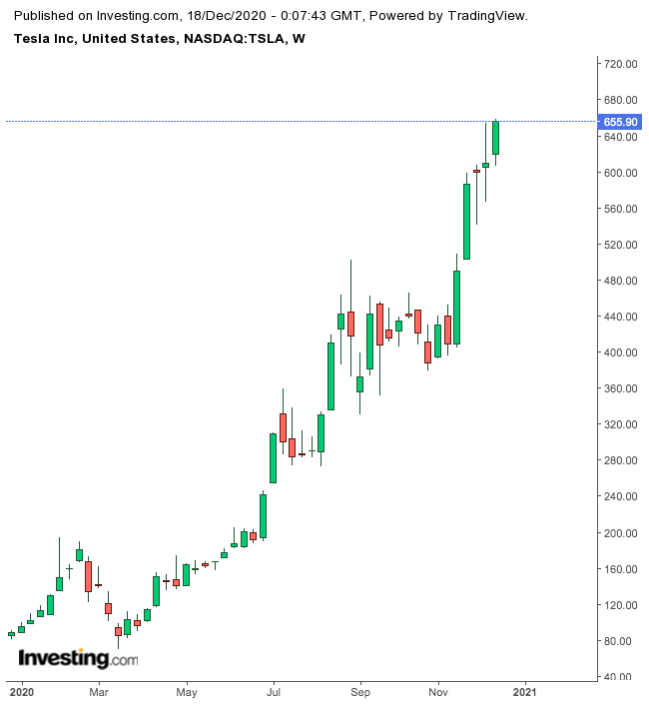As 2020 winds down, there are plenty of boom-and-bust stories that market watchers will remember. But no other stock makes investors more excited than electric car-maker Tesla (NASDAQ:TSLA).
At Thursday’s close, its shares were up more than 650% this year, making it the best performer on NASDAQ. That remarkable turnaround came despite the plague that turned the global economy upside down and all the headline-making drama surrounding company founder and CEO Elon Musk.

When markets open on Monday, Tesla will be part of the S&P 500 Index, achieving blue-chip status and commanding one of the top weightings in this prestigious index, whose members include Apple (NASDAQ:AAPL), Amazon (NASDAQ:AMZN) and Microsoft (NASDAQ:MSFT).
This year’s reversal in Tesla’s fortune came after the company managed to report profits for five straight quarters, a successful completion of a giga factory in China and the start of construction of another similar plant in Germany.
As Tesla’s faithful investors reap the benefit of their belief in Musk’s vision, the big question for 2021 is how one should trade this stock going forward? The analysts’ community is divided.
Among the 23 analysts covering the stock, eight have a 'buy' rating, eight 'hold' and six 'underperform.' The average 12-month target for the next 12 months is $389.79, a significant correction from its current price of $655.90.
Jefferies, while downgrading Tesla to ‘hold’ from ‘buy’ last week, said it’s skeptical that Tesla can one day rule the auto industry.
In a note to clients, Jefferies analyst Philippe Houchois said:
“We don’t believe that Tesla can dominate the industry given the latter’s size, structure and politics. Nevertheless, the multiple challenges to the industry business model ensure a durable competitive edge, with a ‘messianic’ brand reaching far beyond autos, from battery supply to grid storage and autonomous driving.”
While downgrading the stock, Jefferies raised its 12-month price target on Tesla to $650 from $500.
Lofty Valuations
One major challenge for investors and analysts is how to justify further gains for a stock that is trading far above the lofty valuations typically enjoyed only by technology companies with vastly different business models. Tesla’s shares currently trade at nearly 1,000 times earnings, compared with a paltry 14 times for General Motors (NYSE:GM) and 54 times for the NYSE FANG+ Index.
“Therein lies the dilemma. Is Tesla an auto-maker? Or, is it a technology company? Or, is it some sort of an amalgamation of both?” Bloomberg author Esha Dey, wrote in her analysis last week.
Tesla plans to deliver about half a million cars this year, a 36% jump over last year’s levels, but slower than the 50% increase it achieved in 2019. According to Bloomberg data, Wall Street analysts estimate revenue will grow 26% this year, accelerate further in 2021 and then taper off into 2022. Estimates for earnings in 2020 and 2021 have barely budged over the past two years.
But Tesla’s current valuation does not imply that it’s just a car company. Tesla bulls are betting that, just like Apple, the car-maker will soon have a suite of services embedded with its hardware that will make Tesla much more than a car-maker.
Morgan Stanley analyst Adam Jonas told Bloomberg:
“Tesla is moving people away from valuing and analyzing the company by just using the number of units sold and the price of the car, and bringing into account the installed user base and the software and content services offered to those users. In the process, it takes you away from comparing Tesla to car companies and should rather be compared to software-as-a-service companies.”
Bottom Line
After Tesla’s huge price surge this year, the car-maker will remain under intense pressure next year to show that it can grow fast, quickly becoming a company that can make a lot of money by offering different services. At this point, it’s a stock that requires investors to have complete faith in Elon Musk's vision, rather being judged by its business fundamentals.
